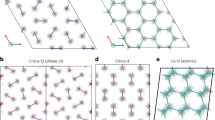Abstract
BOHR'S model of the molecules of hydrogen explains very satisfactorily the light dispersion of hydrogen,1 and gives the same value for the moment of inertia as that deduced from the specific heat;2 but it is generally believed that the model does not explain the diamagnetic property of the gas.3 For, according to P. Langevin's theory,4 the hydrogen molecules must have paramagnetic susceptibility, while as a matter of fact the gas is diamagnetic, as determined by Dr. T. Soné.5 But, as this note will show, this conclusion is not correct.
This is a preview of subscription content, access via your institution
Access options
Subscribe to this journal
Receive 51 print issues and online access
$199.00 per year
only $3.90 per issue
Buy this article
- Purchase on Springer Link
- Instant access to full article PDF
Prices may be subject to local taxes which are calculated during checkout
Similar content being viewed by others
References
Debye, Münchener Akademie (1915), 1.
Reiche, Ann. der Phys., 58 (1919), 682.
J. Kunz, Phys. Rev., 12 (1918), 59.
P. Langevin, Ann. de Chem. et de Phys., 8 (1905), 70.
Sci. Rep. 8 (1919), 115.
K. Honda and J. Okubo, Sci. Rep. 5 (1956), 325.
P. Langevin, l.e.
Author information
Authors and Affiliations
Rights and permissions
About this article
Cite this article
HONDA, K. Bohr's Model of the Hydrogen Molecules and their Magnetic Susceptibility. Nature 110, 664–665 (1922). https://doi.org/10.1038/110664b0
Issue Date:
DOI: https://doi.org/10.1038/110664b0
Comments
By submitting a comment you agree to abide by our Terms and Community Guidelines. If you find something abusive or that does not comply with our terms or guidelines please flag it as inappropriate.



